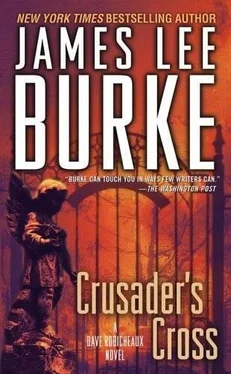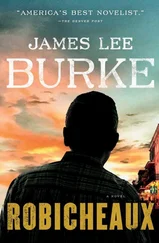"Clete sent letters simultaneously to both Kale and Chalons."
"He deliberately stoked up this guy?"
"I helped a little."
"A police officer?"
"I think Val Chalons's real parents are Lou Kale and Ida Durbin. I think Old Man Chalons died without leaving a will. That means Val has no familial claim on the Chalons fortune. I think the handyman, Andre Bergeron, may be the heir to a hundred million dollars. So Val Chalons hired Jericho Johnny Wineburger to kill the handyman and maybe his wife and child, too."
"You're making some of this up?"
"Nope."
"And Kale thinks I'm involved in a plot to blackmail him or his son, with that kind of money at stake?"
"Seems like it."
"I don't believe this."
"I'll have a talk with Kale."
"Let it slide. Rest up and try not to think. You and Purcel, both. No matter what happens, don't think," he said, then quietly hung up the phone.
In the morning I walked downtown to Koko Hebert's office and waited for him to get off the telephone. Outside, the wind was blowing in the trees on Main Street and the air was still cool and damp-smelling in the shade, but inside Koko's office the atmosphere was stifling, the odor of nicotine wrapped like cellophane on every surface in the room.
"What is it?" he said.
"Did you get the post on Johnny Wineburger from the forensic pathologist in St. Mary?" I said.
"What about it?"
"We're on the same side, Koko. Can't you speak civilly to people?"
"No, you're on your own side, Robicheaux. That said, what do you want?"
I gave up. "Could the wounds on Johnny Wineburger have been made by the same instrument that killed Honoria Chalons?"
"No."
"You're sure?"
"She was cut by an instrument that was honed like a barber's razor. The hatchet Wineburger was killed with must have been used to chop bricks. You trying to make the black guy for Honoria Chalons's death?"
"It occurred to me."
He swiveled himself around in his chair and stared out a side window at a brick wall. From the back, he looked like a sad elephant humped on a circus stool. He drew in on his cigarette, then released a thick ball of white smoke from his mouth. "You're not going to win," he said.
"Excuse me?"
"You think you're going to bring down Val Chalons. But he and his people are just getting started. When they're finished with you, your name won't be worth warm spit on the sidewalk. You and your wife will be picking flypaper off your skin the rest of your lives."
"That's the breaks," I said.
"I hate talking to you," he said.
That night a hurricane watch was in effect from Pensacola, Florida, to Morgan City, Louisiana. But in New Iberia the air was dead, superheated, stained with the smell of dead water beetles, the trees traced with the wisplike patterns of fireflies. Along East Main the windows sparkled like ice with condensation. Just before 11:00 p.m. Dana Magelli called from New Orleans.
"Better turn on CNN," he said. In the background I could hear laughter, music, bottles or drink glasses tinkling.
"Where are you?" I said.
"In the Quarter. Half the Second District is here. We got him."
I had already hit the button on the remote TV control. "You've got the Baton Rouge serial killer?" I said.
"The DNA won't be in for a day or so. But he's the guy. Fibers on the clothes of Holly Blankenship match a shirt in his closet. He got stopped in his Popsicle truck at a DWI check."
On the television screen I saw a New Orleans police official talking on camera, a dilapidated house and weed-infested yard in the background.
"The guy started acting hinky at the check," Dana said. "So we got a warrant on his house. He had a fifteen-year-old hooker tied up in there."
"He's from New Orleans?" I said.
"You sound disappointed," Dana said.
"No, it's just late. Congratulations."
"Yeah. Thought you'd like to know," he replied.
After I hung up, Molly sat down next to me on the couch. Our air-conditioning had broken down and the attic fan was on, the curtains on the living-room window churning in the air. "What was all that about?" she said.
"Dana Magelli says NOPD nailed the Baton Rouge serial killer," I said.
She studied my face. "You have doubts?" she said.
"The guy in custody is from New Orleans. Why would he drive from Baton Rouge to Iberia Parish to dump his victims?"
"It's late. Come to bed," she said.
"I'm going to bring Tripod and Snuggs inside."
"It's not supposed to rain until tomorrow."
"Both those guys need to come inside," I said.
The next morning the sky was the gray-black of gun cotton, the dried-out palm fronds in my neighbor's yard stiffening in the wind. The air was full of leaves, and smelled like iodine or ship's brass on a hot day out on the salt. Helen called me into the office as soon as I got to the department. "I want you to go to New Orleans with me and question the guy they've got in custody," she said.
"Why not wait on the DNA report?" I asked.
"It's a media circus there. Iberia Parish is going to get shuffled out of the deck. We're going to be left with two unsolved homicides."
"I'm not understanding you," I said.
"The Baton Rouge serial killer dropped two DOAs on our doorstep. The guy in custody had a Popsicle route in the Garden District and Baton Rouge. You brought up the question first – why would he drive eighty miles to leave his victims in our parish?"
"So he's not the guy. Wait on the DNA," I said.
"This from you?"
"Why not?"
She paused, her eyes dissecting my face. "You don't want your wife left alone?"
"I've made some serious mistakes in the past and other people had to pay for them."
I saw the impatience go out of her face. "What if we're dealing with two serial killers, not one? Two shitbags working together?" she said.
"It's a possibility," I said.
"I'm taking you off the desk. The D.A.'s office can go play with itself. Sign out a cruiser, bwana. We'll be back by five," she said.
The wind shook the cruiser all the way down the four-lane to New Orleans. When we crossed the bridge at Des Allemands I could see boats rocking in their slips, leaves starting to strip from the trees by the water. In the south, lightning was striking on a bay, quivering in the clouds like pieces of white thread.
The suspect had already been processed into central lockup. His name was Ernest T. Fogel, a man whose race was hard to determine. He had uncut wiry hair, deeply pitted cheeks, and skin that looked chemically tanned. His jacket was not extensive: a molestation complaint that was dropped and two arrests for battery against prostitutes across the river in Algiers. Both victims had worked out of bars a few blocks from his rented room. Inside his file was a social worker's recommendation to the court that Ernest Fogel be kept away from children and pornography. A guard opened Fogel's cell and let me, Helen, and Dana Magelli inside.
Dana was a trim, dark-haired man, a sharp dresser whose style often belied his emotional disposition. He introduced us to Fogel with the strange formality that characterizes relationships between criminals and law enforcement personnel inside the system. The protocol exists less for reasons of professionalism than the fact it allows guards and cops and prosecutors to insulate themselves from certain individuals who are dramatically different from the rest of us. I didn't know if Fogel was one of these or not.
He sat on a cot, unshaved, dressed in jailhouse orange, a metal tray of half-eaten food beside him. According to Dana, Fogel maintained he was innocent of any crime whatsoever. He claimed the fifteen-year-old hooker tied up inside his house was a niece by a former marriage and that he was trying to save her from a life as a crack whore. Simultaneously he kept offering pieces of information that seemed to indicate an enormous knowledge about the killings in the Baton Rouge area. So far he had not asked for a lawyer. I had the sense Ernest T. Fogel was having a grand time.
Читать дальше












